10 Spiritual New Year’s Resolutions for Orthodox Christians

– By Fr. Stephen Lourie
1) Arrive for Church Services on time! We take for granted the Divine Liturgy at the best of times. Often we believe that as long as we are there for the Gospel, Sermon and Communion we have had “a good enough dose of God for the week.” Partaking of the Matins or Orthros service and the full Divine Liturgy will prepare you fully for stepping up to the precious and life giving Chalice of Christ. This will in turn fortify your spiritual journey into the world for the coming week. Our responsibility to Our Lord is to respect the schedule laid out for us, at least once a week.
2) Ask for forgiveness from our family, friends and Christian brothers and sisters in our parish. Forgiveness is a difficult virtue to put into practice and even more difficult to use regularly. Let us therefore use the virtue of forgiveness as a basis for our continued commitment to theosis and by regarding our earthly relationships with one another as truly important. Let us practice forgiveness, as it is the first step in preparing for Holy Confession and Holy Communion each and every Sunday.
3) Learn about praying and prayers. We tend to use the prayers we were taught as children. There are many prayers available for parishioners to use: check the prayer book and ask your Priest, he can assist by providing prayers that pertain to your specific situation(s). Pray often, more than once a day. If you do not have a prayer corner set up in your home, ask your Parish Priest to assist you in setting one up.
4) Become a steward in your parish and community. Become an active, involved, caring Orthodox Christian. Donate to your Parish, become, if not already, involved in keeping our environment clean (God placed us on this earth to care for His creations!!!), donate to food banks, school lunch programs, etc. Create an organized community outreach for the less fortunate residents of your area. As stewards of humanity, it is incumbent upon us, as Orthodox Christians to lead by example.
5) Attend more than one (1) Church Service per Month. Don’t be a “C ” &”E “(Christmas & Easter) Parishioner. Place prayer, worship and Church Services on your list of priorities, above all other recreational activities. The benefit of a fulfilling spiritual life will lead you to many rewards in the future.
6) Put your God-given Talents to use. We all have hidden talents, or talents not used to their full potential. Recognize them, ask for guidance from Our Lord and put them to use for the benefit of God’s Holy Church.
7) Invite your children, grandchildren, siblings and friends to Church Services.Become a host to your own family. Guide them and explain to them that the One Holy Universal and Apostolic Church is the One True Church. Explain that Orthodoxy offers all to its faithful. Bring one guest to Church per year at least and allow God to do His work.
8) Contact your family members that have stepped away from your family; or if you have stepped away, call your family. Practice patience, understanding and forgiveness. We are on this earth but once. We have one opportunity to practice forgiveness and ask for it as well. It is never wrong to come back home, even after a lengthy absence. We should never be embarrassed to admit our faults to our families and our desire to renew our relationships. We must remember, we are not perfect, we all have faults and we never know when we may be called by God to return home.
9) Experience the life of the Church and her many gifts to heal you. Attend Church services; come to Confession and Communion on a regular basis. We were born unto this earth dependent upon our Lord. Use Confession to unburden your sins and Communion to heal you. Rely on your Parish Priest to be your Father Confessor and Spiritual Guide.
10) Recognize that we are tested by Our Lord and tempted by the devil himself, daily. We are put to the test daily, as in school, so in life. Pray frequently, ask for guidance, see beyond the test, look for the good only in all situations. Avoid temptations that are “too good to be true.” Recognize that we are accountable for all of our thoughts, actions and deeds.
h/t Simply Orthodox
Obedience and the Holy Family
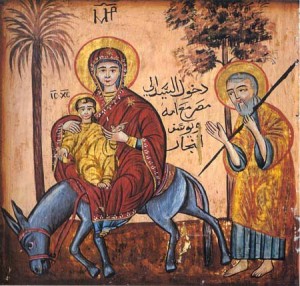
The Gospel of Matthew 2:13-23
When the wise men departed, behold, an angel of the Lord appeared to Joseph in a dream and said, “Rise, take the child and his mother, and flee to Egypt, and remain there till I tell you; for Herod is about to search for the child, to destroy him.” And he rose and took the child and his mother by night, and departed to Egypt, and remained there until the death of Herod. This was to fulfill what the Lord had spoken by the prophet, “Out of Egypt have I called my son.”
Then Herod, when he saw that he had been tricked by the wise men, was in a furious rage, and he sent and killed all the male children in Bethlehem and in all that region who were two years old or under, according to the time which he had ascertained from the wise men. Then was fulfilled what was spoken by the prophet Jeremiah: “A voice was heard in Ramah, wailing and loud lamentation, Rachel weeping for her children; she refused to be consoled, because they were no more.” But when Herod died, behold, an angel of the Lord appeared in a dream to Joseph in Egypt, saying, “Rise, take the child and his mother, and go to the land of Israel, for those who sought the child’s life are dead.” And he rose and took the child and his mother, and went to the land of Israel. But when he heard that Archelaos reigned over Judea in place of his father Herod, he was afraid to go there, and being warned in a dream he withdrew to the district of Galilee. And he went and dwelt in a city called Nazareth, that what was spoken by the prophets might be fulfilled, “He shall be called a Nazarene.”
![]()
Obedience is not a word we like to think about in our 21st century life. We don’t really like to be obedient to anything but ourselves but in essence we are all obedient to one thing or another.
When I was entering the monastery we had classes on various monastic topics. We spent time discussing and meditating on the monastic vows; poverty, chastity, obedience, stability these are the vows that all monastics take. I found that the most difficult of all of these was the vow of obedience. I was not concerned about obedience to the rule of the monastery or to the abbot it was the bell that I had an issue with.
Several times a day, the monastery bell would ring to call us to prayer. Not matter what you were doing, when the bell rang you dropped it and set out for the chapel for prayer. I had a very difficult time with this. I would be right in the middle of something and the bell would ring. Not matter what time of the day; it always seemed I was in the middle of something. Obedience to the bell was a big part of the life of a monk and a difficult lesson for me to learn.
In the Gospel for the Sunday after the Nativity there are several lessons of obedience to God and His call on us. Joseph the Betrothed is several times called to obedience. We read earlier in the Gospel that when he finds out that Mary is pregnant he wants to divorce her quietly. The Angel comes to him is a dream and tells him that all will be well. He is obedient to God’s will and takes Mary as his wife and raises Jesus as his own son. Latter we read of flight from Egypt. Again the Angel comes to Joseph and tells him to take the child and his mother and flee to Egypt to protect Jesus. He does this without question, once again obeying God’s will.
The Wise Men are also obedient to the will of God. Herod wants them to return to him to give him information on the new child so he can worship him. The Angel comes to them and warns them to go another route home and they follow the will of God and do so.
The Theotokos is also an example of obedience. She agrees to be the mother of God without question and walks in His will for the rest of her life. And the perfect example of obedience is Jesus Himself. In the Garden, the night before his crucifixion, he pleads with God the let this cup pass from Him. In the end He prays that it be God’s will and not His that is done that night.
Walking in the will of God is not an easy thing, if you are life me you want to be in control of everything, and we quickly learn that if we want to be in God’s will be have to obey Him and His Church.
Obedience is not an easy thing but it is something that we have to do and that all of us are called too.
A Blessing for the New Year
God, bless to me the new day,
never vouchsafed to me before;
it is to bless your own presence
you have given me this time, O God.
Bless to my eye,
may my eye bless all it sees;
I will bless my neighbor,
may my neighbor bless me.
God, give me a clean heart,
let me not from sight of your eye;
bless to me my family,
and bless to me my means.
Ancient Celtic Prayers collected by Alexander Carmichael (1832-1912), published in Carmina Gadelica (Edinburgh: Floris Books, 1992). These are prayers, hymns, and incantations collected in the Highlands and Islands of Scotland in the 18th century.
Is there Room in the Inn?
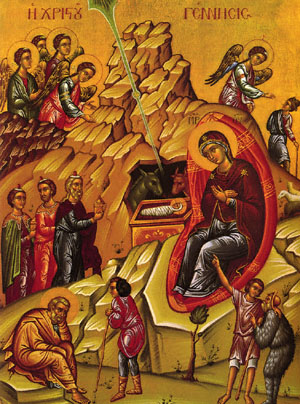
We have all heard the story before, Joseph has to go to Bethlehem to be counted in the census and he takes his new wife, Mary with him. Mary is great with child as they set off on the journey that will take several days to make. They arrive and we hear that “her time has come” they attempt to find lodging, but because everyone, literally everyone, is in town there is no room. Door after door, they knock and get the same answer from within; there is no room in the inn. There is no place for a mother about to give birth and her husband.
As you can imagine, Joseph is frantic at this point, he is looking for any place for Mary to lay her head. Finally they find room. It is not the Ritz but he does not care. The Inn Keeper takes him out behind his place to a cave that has been hewn in the side of the hill. Inside are the beasts of burden, the ox, the cow, the donkey, maybe some sheep and perhaps even a pig. But Joseph does not care, he needs a place and here is a dry place for them to get out of the weather and Mary can give birth to their child.
There is no bed, no place for Mary to lay her head, just a manger, the trough where the animals only moments ago were eating, this is the place that Mary will lay her child. She will place him in the lowliest of places after the birth, wrap him in whatever they can find to keep him warm, and watch over him. They both have some understanding of what is going on, but they are not quite sure. They have both been visited by angels to assure them that all will be well, but as Joseph looks around he has his doubts. What am I doing, the doubts start to form in his mind. In the Icon of the feast, we see Joseph, down at the bottom all by himself talking to a little man with a confused look on his face. Then strangers start to arrive, they say they have come to worship the child, and they have brought gifts.
But what of the Inn? We understand that what we are talking about here is basically people’s houses that had rooms to let. These were not hotels as we think of them today more like spaces for people to sleep and maybe get a meal in the morning. But there was no room.
Two Sunday’s before Christmas we hear the Gospel story about people being invited to a banquet and all of the excuses they have for not coming. One has to tend his crops, another bought a new ox and needs to care for it, and the last one says he just got married, and well, his new wife won’t let him go! This is the reason that particular Sunday is called Excuse Sunday!
The people in this story had no room for the feast, the king was inviting them to the palace and they had no room in their busy lives for the king. The Inn Keeps had no room for the king, they were busy with all of the guests and trade and what not, and they had no room for the King of Kings. Tonight, this night, that same King is knocking on the door of your hearts looking for a little bit of room.
He was born into the lowliest of conditions to remind us that we need to be poor in spirit. His birth was announced first, not to Kings, but to simple shepherds on the hill side tending their sheep. We see in this event a lesson of humility, we need to be humble of heart and of spirit. The Kings will come and worship him, and bend their knees, to show to the world that this little baby will be the King of the Universe. God has bent His knee and come down to save His creation. The creator of all has taken on the form of His creation that we might take on the form of gods!
He was born into this world in the image and likeness of God so he might renew that image that all of us have been given, that image and likeness of God that resides inside each and every one of us.
He was born to the lowliest of people to being the message of hope and the message of peace to the world. He did not come to free us from our physical bondage as a military leader but he came to free us from the bondage of sin, the sin of our first parents, as a spiritual leader. Jesus Christ is the first born of all, He is the ultimate High Priest and has come with open arms to welcome us home.
In the hustle and bustle of these days have we made room for him? Have we taken time to ponder and meditate on what this season is all about, it is not about the parties and the gifts, it is about the ultimate gift, that gift that God has given us this night, the gift on Sonship, the gift of life! God has condescended to come down to the earth, and become one of us, to free us from our sins! He is knocking on the door of your heart, He is looking for a place to lay His head, He is looking for a place to make his abode. Do we have room for him? Are we willing to open the door for Him and welcome him to the party of our lives?
Thy Nativity, O Christ our God, hath shined the light of knowledge upon the world; for thereby they that worshipped the stars were instructed by a star to worship Thee, the Sun of Righteousness, and to know Thee, the Dayspring from on high. O Lord, glory be to Thee.
Christ is Born! Glorify Him!
Nativity Message 2012

The Feast of the Lord’s Nativity 2012
“I bring you good news of great joy that will be for all people. Today in the town of David a Savior has been born to you: He is Christ the Lord.” (Luke 2:10-11)
It is with these words that the Angel spoke to the shepherds who were keeping watch. The Angel spoke these words to comfort them and also to announce that the long awaited Messiah had been born. Scripture tells us that the whole of creation rejoiced when Jesus was born as the separation between God, and His creation had been fixed and, as we sing in the Troparion of the Forefeast, “Eden has been opened for all.”
Jesus Christ, the Son, the Word, the Image of God, was born to restore that Image. He was formed in the womb of the Theotokos and become human so that He may be formed in us. Christ is in us, and we are in Him. We sanctify the world around us by the Spirit that flows from our hearts. This is the true meaning of Christmas, God with us, and we are with God!
Each of us, all of humanity has been created in the image and likeness of God. When we look at another person we have to recognize that image of God in them, we are living Icons of Christ and the love God has for His creation, is the love that we should have for that same creation. No longer can we look upon humanity as merely objects. We need to see Christ in everyone we come into contact with.
He was born into the lowliest of conditions, in a stable in Bethlehem to parents who had nothing but love for each other. He was born poor to remind us to be poor in spirit. His birth was announced, not to kings but to shepherds, those who held the lowest position in society, to teach us the importance of humility. The kings of Asia, the Wise Men, came to worship and bend their knee before Him to teach us that He is the King of the Universe. This little baby was born to show us that His love for us knows no bounds. In return for this expression of endless love, He asks only love in return. He seeks some tiny space in the Inn of our hearts and our souls. Will we welcome Him in, or like the Inn keeps of old, tell Him there is no room?
The rich God emptied Himself and became human like us. The God who created the heavens and the earth, through the outpouring of His Divine love for us, accepted to be born in a lowly manger. The God who holds the world in His hands allowed Himself to be held in the arms of the Holy Virgin. Through the Lord’s Nativity the path to salvation has been set for us, this way is through sacrifice, humility, and compassion toward others just as God Himself has sown mercy on us. Through the Incarnation in this little baby God recreates humanity and bestows upon us the riches that had been lost. Through the Nativity of Christ, God reveals to us the way we can truly be rich in the image of the One who is rich, that is God Himself!
I pray, at this most magnificent feast that each of us will recognize the riches that God has revealed to us. Let us prepare our souls to receive the riches of God and be thankful that He sent His Son to be born that He might save us.
I embrace you in Christ the Lord. May we all celebrate these Holy Days of Christmas and Theophany in the riches of peace and the love of God.
Your brother in prayer to God,
Fr. Peter
Nativity Message of Archbishop Nicolae
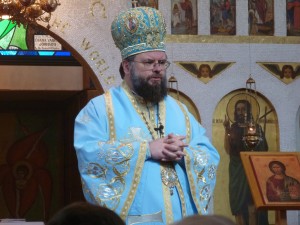
† NICOLAE
by the mercies of God
Archbishop of the Romanian Orthodox Archdiocese in the Americas
To our beloved clergy and Orthodox Christians,
peace and joy from Christ the Lord,
and from us hierarchical blessings.
For unto us is born a little child,
who is God from all eternity.
(Kontakion of the Nativity)
Most Reverend Fathers,
Beloved Christians,
On this Royal Feast day, I too bring you the tidings that the God who is “from all eternity” has been born as “a little child”, bringing to each of us joy and great hope. The joy comes from that of the Holy Family and of the angels who announced the miracle in the manger of Bethlehem, and the hope is the hope of salvation through the birth of this “little child.”
The joy of the Lord’s Nativity is described in the songs of this day of great celebration: “Rejoice greatly, O Heaven! Be glad, O earth! The Lamb of God has been born on earth.” “Rejoice, holy ones; you heavens be glad; and you mountains, sing with glee, for Christ our God is born.” “The powers of Heaven rejoice, the earth and all mankind dance with glee.” This is the joy of the proclamation of the fulfillment of the prophecies, of the descent of God to earth, of the “Kingdom of God drawing near.” And it is also the joy of the birth of a child as a sign of the blessing of God.
Let us remember that the parents of the Virgin Mary, Joachim and Anna, had no children. They prayed with perseverance for many years, they had patience, and they put their hope in the help and work of God. And God listened to their prayer and blessed them more than they even hoped. For they prayed for a child that would take away the sign of infirmity and of the lack of blessing which was over their family. They received a child, the Virgin Mary, who would give the world its Savior. The blessing of God on this family represented the blessing on the human race that was awaiting its Deliverer from sin and infirmity.
Later, the joy and the blessing were poured out upon the Virgin Mary at the Annunciation: “Rejoice, you who are full of grace, the Lord is with you. Blessed are you among women!” (Luke 1:28). Mary was in prayer, just as was her custom from the temple, but still she marveled at this news. What blessing was this that was announced? The Archangel explained to her the plan of God for this pure virgin: “Fear not, Mary, for you have found favor with God. For behold you will conceive in your womb and will bear a son, and you will call him Jesus” (Luke 1:30-31). For a human being who had dedicated her life to the service of God, this news was unfathomable. What could be the meaning of this blessing which was more appropriate for a married woman desirous of bringing children into the world? What the Virgin understood and accepted was the fact that the proclamation of the archangel was the revelation of the will of God. The salvation of mankind would be fulfilled through the blessing of God and through the response of the Virgin: “Behold the handmaid of the Lord; let it be unto me according to Your Word” (Luke 1:38). The response meant becoming pregnant in her womb and, later, raising a child as the fruit of the blessing of God. The response also meant a mysterious joy that this child was ordained by God to fulfill a mission, and not just any, but the salvation of the world. And that she, the Virgin Mary, had become the vehicle of the work of God.
Through these things that have been said, we understand that the Lord’s Nativity reveals to us the way in which God poured out His blessing and found the way by which to bring salvation to man. We also understand that every child is the fruit of the blessing of God upon a family, a blessing which brings much joy. The child that God sends into a family has a mission ordained by God. The parents become partakers in this mission by means of their bringing the child into the world, and by raising and teaching it. Joachim and Anna are called “the holy, righteous, godly parents” because they received the child Mary. She herself received the name ”Birthgiver of God” because she gave physical birth to the Son of God. St. John of Damascus says that “this name contains the whole mystery of salvation.” The mystery of the maternity of the Holy Virgin does not only pertain to the physical birth. For she was, and remained, a Virgin. The fulfillment of her maternity is sacrificial love. Through love for the one to whom one has given birth the egoism of man is conquered. In this love we can discover the image of love for our neighbor, says Father Georges Florovsky. In our love for our child we can understand the commandment to love our neighbor “as ourselves.” Therefore the mystery of the Savior’s Nativity through the Virgin Mary reveals the mystery of our salvation. Father Florovsky continues by saying that the love of the Birthgiver of God is all-embracing. It includes the Savior’s sacrifice on the Cross, and through that it includes us all who follow Him. The love of the Theotokos is perfected through the fact that she is the protector of Christians and intercessor for us.
Most Reverend Fathers, Beloved Faithful,
At the celebration of the Lord’s Nativity it behooves us to remember the significance of the birth of a child as a sign of the blessing of God which brings joy to the family. In our world, ever more estranged from God, we are tempted to forget what a child represents, and to follow the world in not desiring children. Christian parents must not forget the responsibility they have before God. St. Paul the Apostle tells us that woman is saved through childbearing, meaning not only their birth for this world, but also for the eternal Kingdom through baptism. According to the example of the Mother of God, motherhood and fatherhood mean sacrificial love for children. This means their Christian education, going together with them through the temptations of this world, the example of spiritual life in the family. The families that fulfill these things become co-laborers with God and fulfillers of the Divine will.
At this bright feast my desire for you all is that the Child Jesus will bring you blessing and joy. I desire that you rejoice in the children God has given you, both the physical and spiritual ones. I desire that you find the way of salvation in the Church, and that you hold tightly to the hands of all your loved ones on this pathway.
I enfold you in a brotherly embrace in Christ the Lord, and I wish you the Holy Feasts of Christmas, the New Year, and Theophany in health, peace, and spiritual joys.
Many Years!
Your Brother in Prayer to God and Desirer of every Heavenly Good,
† NICOLAE
Ministering to those who Minister
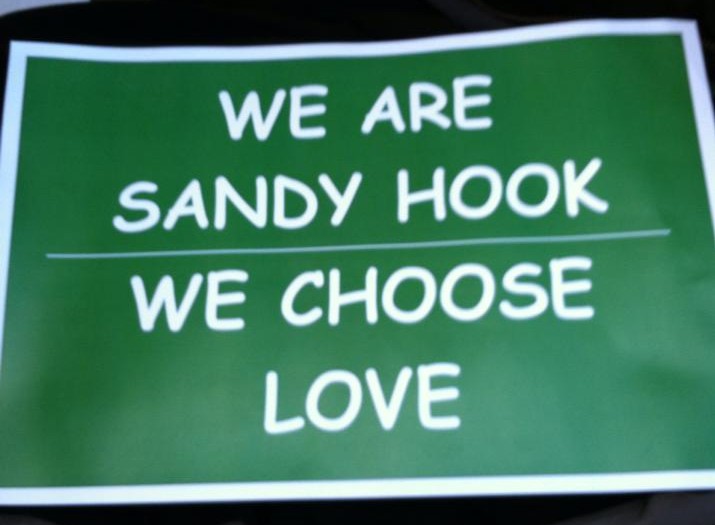
Like all of you, I was affected by the school shooting in Newtown, Connecticut. Someone on Facebook remarked that they had the same feelings on Friday as they did after 9/11. There is something about school violence that affects everyone, even those of us not directly affected by it.
During the sermon on Sunday, I spoke of hope, the hope that we need and that we find in the new born baby that all will be well. We will ask questions and seek a resolution and try to make sure this never happens again. But we move on.
This past Tuesday, December 18th, I was deployed by International Orthodox Christian Charities to connect with the Orthodox Clergy in the affected area to see what help the Orthodox church could provide. I spent several hours with them as they told stories of what they had heard from their parishioners. The people they had met with were friends of those directly affected the ones who knew the victims and their families, and other people. It was a blessing to be able to minister to those who minister.
I was able to spend some time in Newtown at the various memorials just talking to people. People had come from all over just to pay their respects and offer a prayer or two. I was blessed to be able to pray with a few of them as they stood by the roadside trying to make sense of it all. The amazing part of it all was silence in the Town. It was like what you experience at the Vietnam Memorial in Washington, DC. The silence of respect and the silence of prayer was all over Town in an extraordinarily respectful way. It was as if the whole Town was a memorial.
Standing and looking at the twenty-six Christmas trees that had been erected close to the school was a moment that I will not soon forget. Reading the messages of sympathy and of hope brought both sadness and joy to my heart at the same time. All over the town were green and white signs, the school colors, which spoke the message of hope, “We are Sandy Hook, we Choose Love.” I asked a few people what that meant, and they all said that they were choosing not to hate, hate anyone, but to come together in love. Love is the only thing that will see them through.
In the coming weeks the television news vans will leave, the people will stop dropping off items at the memorials, and Newtown will slowly, very slowly, return to some sense of normalcy. Newtown will always be remembered for this, but this remarkable town in Western Connecticut, will be a little closer to each other. The moving vans were moving the desks and chairs and other mementos out of the school and bringing them to the new school where the children will complete the school year but even with a new coat of paint, the children and teachers and staff will never be the same. They will be forever bonded together because of this shooting. They will struggle together to try and make sense of it all and will try to move forward.
I am blessed that I had a small part to play in all of this, and my prayer is that I was able to bring some hope and some encouragement to the people of Newtown. They will all live forever in my heart!
Sermon ~ Making Sense of it All

“A voice was heard in Ramah, lamentation, weeping, and great mourning.
Rachel weeping for her children, refusing to be comforted, because they are no more.”

For my sermon today I addressed the recent School Shooting at the Newtown, Connecticut Elementary School. I am posting the audio of the sermon only as I went off text at the very start.
Sermon ~ Making Sense of it All
Orthodox Christian Leaders Discuss Social Outreach At White House Conference
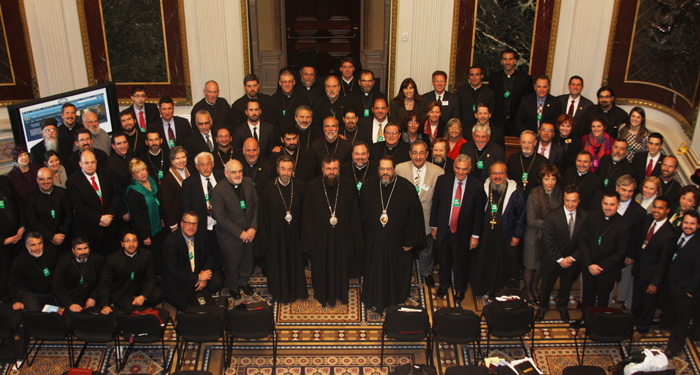
Baltimore, MD (IOCC) — More than 80 representatives of the nation’s Orthodox Christian service organizations joined together at the White House today to discuss strategic service alliances with the White House Office of Faith-Based and Neighborhood Partnerships. The White House Conference on Orthodox Christian Engagement was hosted by the White House Office of Public Engagement in conjunction with the White House Office of Faith-Based and Neighborhood Partnerships and facilitated by International Orthodox Christian Charities (IOCC).
Present to discuss the role of Orthodox Christians in social outreach, disaster response, and community development in the United States were Archbishop Nicolae of the Romanian Orthodox Archdiocese in the Americas and liaison to IOCC from the Assembly of Canonical Orthodox Bishops of North and Central America. Also present were Bishop Gregorios of Nyssa of the Carpatho-Russian Orthodox Diocese and Bishop Sevastianos of Zela, Chief Secretary of the Greek Orthodox Archdiocese Eparchial Synod, representing Archbishop Demetrios of America, a member of the Presidential Commission for Faith-Based Organizations. The Orthodox Christian hierarchs were joined by IOCC Board Chairman, Michael S. “Mickey” Homsey, along with IOCC board members and staff, Orthodox Christian clergy and leaders of Orthodox Christian service organizations.
“The opportunity for this level of discourse with the White House is an important way to build understanding between our communities and contribute toward serving needs here in the United States,” said Homsey. “The conference is an important step toward uniting the efforts of Orthodox Christians to effectively serve their communities and builds on similar service IOCC has provided in more than 50 countries around the world over the past twenty years.”
The half-day conference brought together the community’s leadership to learn more about its multifaceted ministries, and to explore potential collaborations offered by the federal government to support the Church’s service work.
“The Orthodox Christian community plays a critical role in social outreach, disaster response, and community development,” said D. Paul Monteiro, Associate Director of the White House Office of Public Engagement. The conference provided a forum for dialogue on that outreach and areas for mutual cooperation.
Preceding the White House conference was a gathering of IOCC’s Frontline, a national emergency response network comprised of volunteers trained in disaster response, organized following the events of September 11. IOCC recently deployed members of the Frontline to assist in coastal communities along the Eastern seaboard following Superstorm Sandy and seeks to expand its network of volunteers nationally to serve more communities through disaster preparedness and emergency response.
In addition to emergency response, IOCC’s efforts in the United States have focused on the provision of educational assistance to children in underserved communities throughout the country and facilitation of hands-on community outreach efforts through volunteerism and home building projects.
ABOUT INTERNATIONAL ORTHODOX CHRISTIAN CHARITIES
IOCC is the official humanitarian aid agency of the Assembly of Canonical Orthodox Bishops of North and Central America. Since its inception in 1992, IOCC has delivered more than $400 million in relief and development programs to families and communities in 50 countries. IOCC is a member of the ACT Alliance, a global coalition of more than 130 churches and agencies engaged in development, humanitarian assistance and advocacy.


